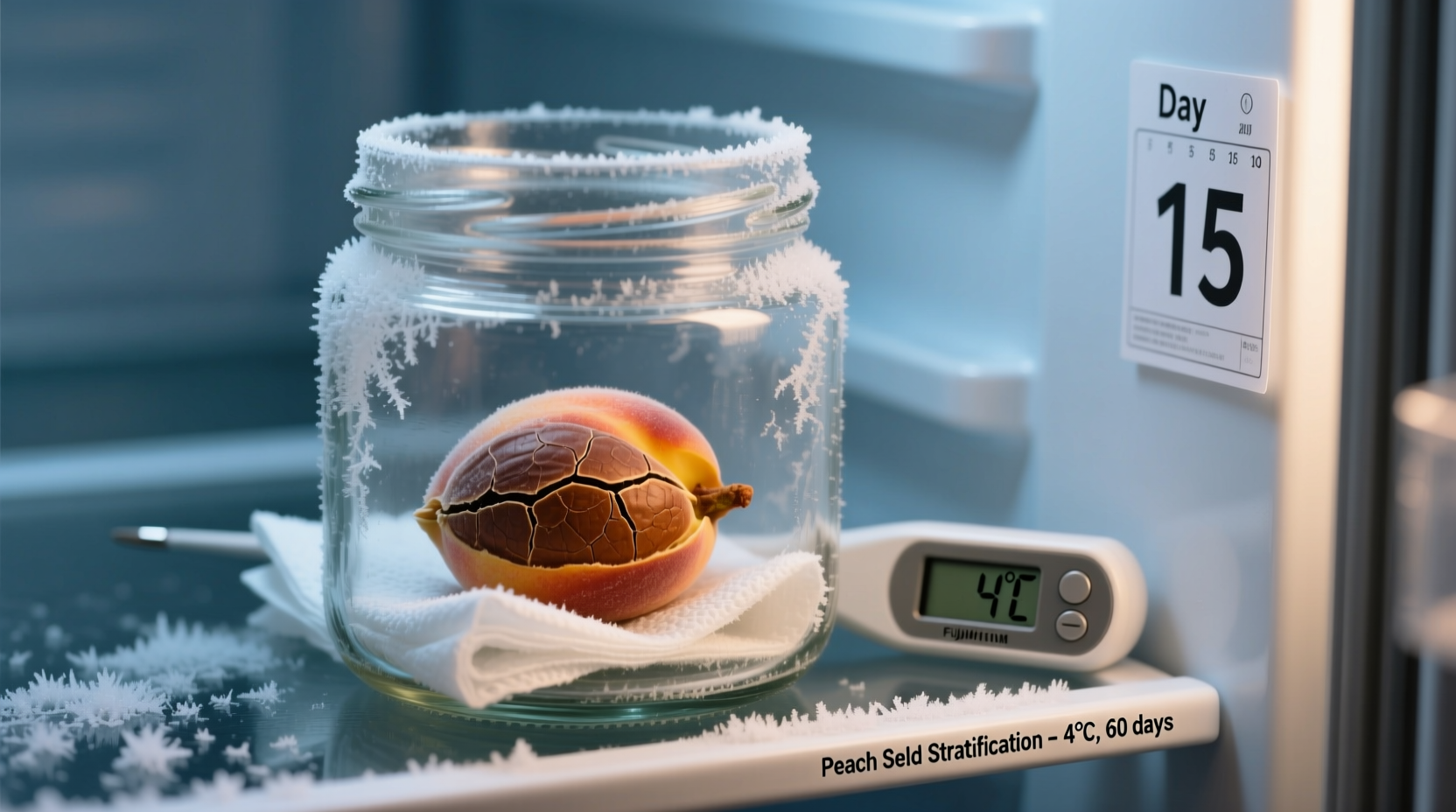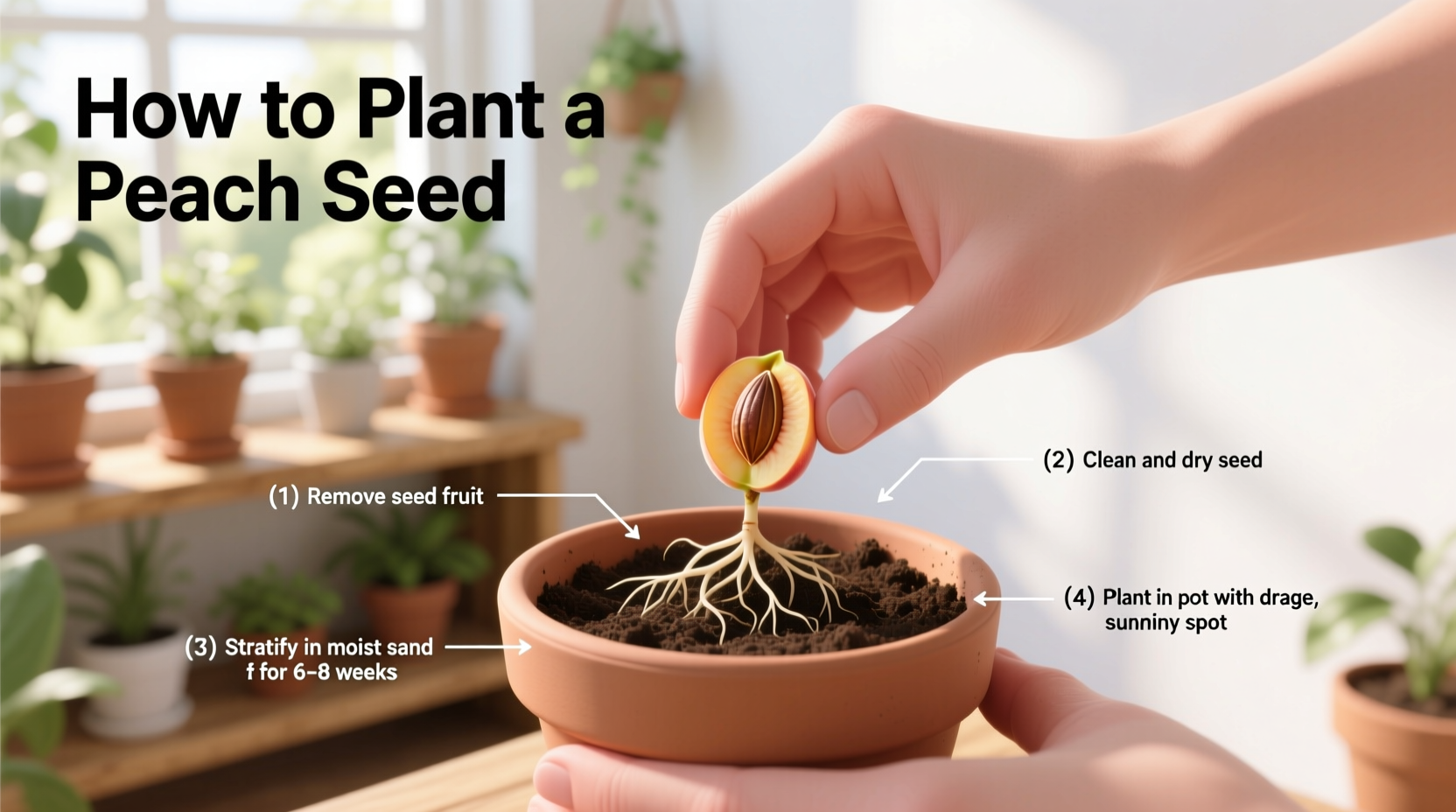Plant a peach seed by selecting a fresh, untreated seed from a ripe peach, cleaning it thoroughly, chilling it for 8-12 weeks (stratification), then planting it 2-3 inches deep in well-draining soil. Keep soil consistently moist and provide 6-8 hours of direct sunlight daily for successful germination within 4-8 weeks.
Why Growing Peach Trees from Seed Matters
There's something magical about nurturing a peach tree from a single seed you've saved from your favorite fruit. While commercial growers typically use grafting for consistent fruit quality, planting peach seeds offers unique advantages for home gardeners. You'll develop a tree genetically adapted to your specific climate and soil conditions, potentially yielding fruit with unexpected delicious variations. Plus, the process connects you directly to nature's cycles in a way few gardening projects can match.
Step 1: Selecting the Perfect Peach Seed
Not all peach seeds will successfully germinate. Your first critical decision determines your entire project's success rate.
Choosing the Right Fruit Source
Select peaches from local farmers' markets or your own tree rather than store-bought varieties. Commercial peaches often come from trees grown in different climate zones, making their seeds less likely to thrive in your specific conditions. Look for fully ripe, organic peaches with plump, undamaged pits.
| Seed Quality Indicator | Acceptable | Unacceptable |
|---|---|---|
| Seed Color | Light to medium brown | Dark brown or black |
| Texture | Hard, intact shell | Cracked or moldy |
| Source | Local, ripe fruit | Supermarket fruit |
Step 2: Proper Seed Preparation Techniques
Skipping proper seed preparation dramatically reduces germination success. Follow these professional techniques used by horticulturists.
Cleaning and Drying Your Peach Seed
Gently remove all fruit residue from the pit using a soft brush under running water. Never use soap or chemicals. Allow the cleaned pit to air-dry for 24-48 hours in a well-ventilated area away from direct sunlight. Proper drying prevents mold during the crucial stratification phase.
The Critical Stratification Process
Peach seeds require cold treatment to break dormancy—a process called stratification. The USDA Agricultural Research Service confirms that most stone fruit seeds need 600-900 chilling hours below 45°F (7°C) to germinate properly.
- Wrap the dried seed in a slightly damp paper towel
- Place in a sealed plastic bag labeled with date
- Store in refrigerator (33-40°F / 1-4°C)
- Check weekly for mold or premature sprouting
- Maintain for 8-12 weeks (minimum 600 chilling hours)

Step 3: Planting Your Prepared Seed
Timing your planting correctly significantly impacts your seedling's survival rate. The University of California Cooperative Extension research shows that spring-planted peach seeds achieve 78% germination success compared to just 42% for fall planting in most temperate zones.
Soil and Container Requirements
Use a 6-8 inch deep container with drainage holes. Fill with a well-draining mix of:
- 50% potting soil
- 30% perlite or coarse sand
- 20% compost
Avoid garden soil which may contain pathogens or compact too tightly. The ideal pH range for peach seedlings is 6.0-7.0 as documented by Cornell University's horticulture department.
Planting Depth and Technique
Plant the seed 2-3 inches deep with the pointed end down. Water thoroughly until moist but not soggy. Place in a warm location (70-85°F / 21-29°C) with indirect light. Maintain consistent moisture—never allowing the soil to completely dry out.
Step 4: Caring for Your Emerging Seedling
Once your seed shows signs of growth, proper care becomes critical for developing a strong root system.
Light and Temperature Requirements
Move your container to a location receiving 6-8 hours of direct sunlight daily once the sprout emerges. Maintain daytime temperatures between 70-85°F (21-29°C) and nighttime temperatures above 50°F (10°C). Protect from frost at all costs during the first year.
Watering Schedule for Optimal Growth
Water when the top inch of soil feels dry. Overwatering causes root rot, while underwatering stresses the young plant. During active growth (spring through summer), most seedlings need watering 2-3 times weekly. Reduce frequency in winter when growth slows.
Step 5: Transplanting and Long-Term Care
Transplanting your seedling to its permanent location requires careful timing and technique.
When and How to Transplant
Wait until your seedling reaches 12-18 inches tall and has developed several sets of true leaves—typically 4-6 months after germination. Choose a location with full sun and well-draining soil. Dig a hole twice as wide as the root ball but no deeper. Gently loosen roots before placing in the hole.
First-Year Care Essentials
During the first year, focus on root development rather than fruit production. Remove any flowers that appear to direct energy into root and branch growth. Apply a balanced, slow-release fertilizer in early spring. Mulch around the base (but not touching the trunk) to retain moisture and regulate soil temperature.
Troubleshooting Common Problems
Even with perfect care, challenges may arise. Understanding these issues helps you respond appropriately.
Why Isn't My Seed Germinating?
If your seed hasn't sprouted after 8 weeks, check these common issues:
- Insufficient stratification time (needs minimum 8 weeks)
- Seed was too dry during stratification
- Soil temperature too cold after planting
- Seed was from a hybrid variety with low viability
Managing Pests and Diseases
Young peach trees face several threats. The most common issues include:
- Aphids: Spray with insecticidal soap
- Powdery mildew: Improve air circulation
- Borers: Apply protective tree wrap
Prevention is always better than treatment—maintain proper spacing and avoid overhead watering.
Realistic Expectations for Home Gardeners
Understanding the timeline helps maintain enthusiasm through the growing process. Based on research from the National Gardening Association, here's what to expect:
| Time Period | Expected Development | Success Rate |
|---|---|---|
| Weeks 1-4 after planting | Germination begins | 65-80% |
| Months 2-4 | Seedling establishes roots | 50-70% |
| Year 1 | 12-36 inches growth | 40-60% |
| Years 2-4 | First flowers and fruit | 30-50% |
Remember that peach trees grown from seed typically take 3-5 years to produce fruit, and the fruit characteristics may differ from the parent tree due to genetic variation.
Frequently Asked Questions
How long does it take for a peach seed to sprout after planting?
Most properly stratified peach seeds sprout within 4-8 weeks after planting when kept at optimal temperatures (70-85°F). The exact timing depends on seed viability, soil temperature, and moisture levels. Patience is essential, as some seeds may take up to 12 weeks to show signs of growth.
Can I plant a peach seed directly from the fruit without drying or chilling?
No, planting a fresh peach seed directly will likely fail. Peach seeds require a cold stratification period of 8-12 weeks to break dormancy. Without this chilling process, germination rates drop below 10%. The seed also needs proper cleaning and drying before stratification to prevent mold.
Will a peach tree grown from seed produce the same fruit as the parent tree?
Not necessarily. Peach trees grown from seed exhibit genetic variation, meaning the fruit may differ significantly from the parent tree in size, flavor, texture, and ripening time. For identical fruit characteristics, grafting is required. Many home growers enjoy the surprise element of seed-grown trees.
What's the best time of year to plant peach seeds outdoors?
In most temperate climates, early spring (after the last frost date) is ideal for outdoor planting. This gives your seedling the entire growing season to establish before winter. In warmer zones (USDA 7-9), you can plant in fall for natural winter stratification, but protect young seedlings from extreme cold.
How deep should I plant a peach seed?
Plant peach seeds 2-3 inches deep in well-draining soil. Planting too shallow risks the seed drying out, while planting too deep may prevent the sprout from reaching the surface. Always position the seed with the pointed end facing downward for optimal root development.











 浙公网安备
33010002000092号
浙公网安备
33010002000092号 浙B2-20120091-4
浙B2-20120091-4